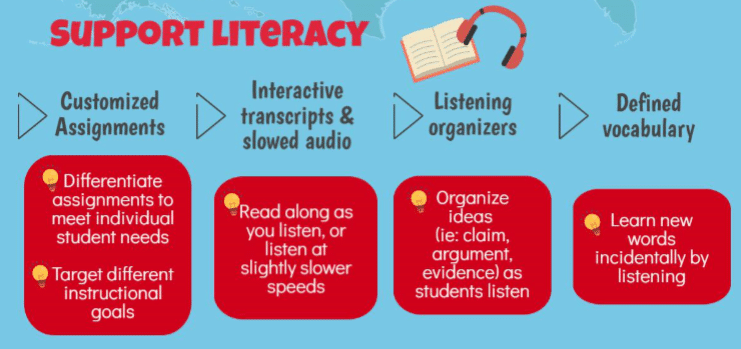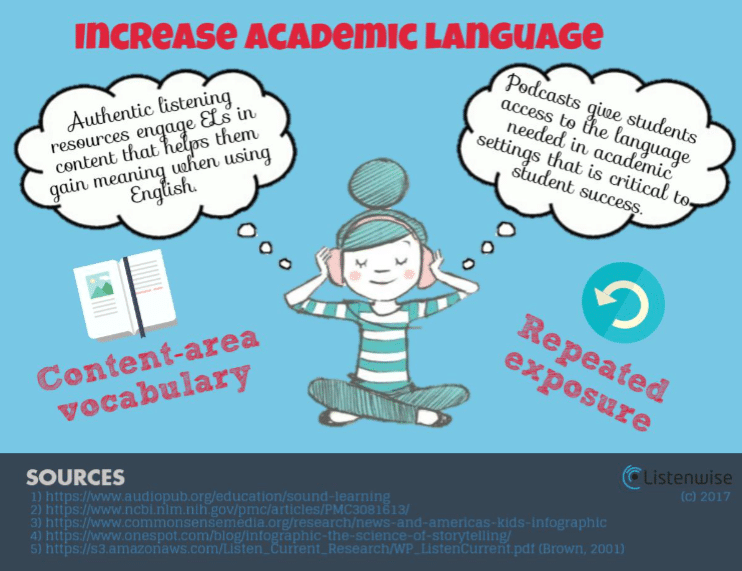Listenwise is a flexible resource and can be used to meet many different goals for your students. Listening advances oral language skills and literacy through a wide range of activities and we describe a few in this blog.
Read this blog to explore additional ideas about using Listenwise to enhance engagement and critical thinking about content. If you use Listenwise audio stories in other ways with your students, please share with us!
Podcasts to Meet Listening and Speaking Standards
Audio provides another modality for students to acquire information and comprehend content. It is a challenge to cover all necessary standards in the time available. Listenwise is uniquely designed to meet speaking and listening standards while teaching content. These podcasts are a great addition to what you are already teaching, and can be used together with texts and other media to spark conversations and analytical thinking.
Use podcasts for debates: Every Friday, we post a special Current Event story with a topic that will inspire a lively debate. Use these stories as a springboard for structured debates in your classroom. Students can defend their reasoning, express their opinion, take a side in a debate, and articulate the evidence to support their position.
Use podcasts to build language practice: Plan ways for students to have structured conversations and process the information after listening. Encourage students to use academic language when speaking in class and share their thoughts and ideas. Be sure to provide activities for students to use all language modalities: listening, speaking, reading and writing.

Podcasts Support Literacy
Students can understand more challenging language when listening than when reading. Listening can make complex ideas more accessible and expose students to high-level vocabulary and language patterns that are not part of their everyday speech. Students can also read along with the transcript, see and hear the words at the same time, and replay words to help with pronunciation and spelling skills.
Use podcasts to increase vocabulary: Incidental vocabulary exposure while listening provides opportunities to learn the meaning of unknown words in the context of a story. Also, when students hear idioms and figurative language they are able to understand them within the whole context, rather than as individual words.
Use podcasts with struggling readers and English learners: Students who have not mastered decoding can learn content, participate in discussions, and use critical thinking skills when listening. Add supports and scaffolding (transcripts, pre-teaching vocabulary, building background, monitoring listening comprehension) to ensure student success and understanding. For students who need additional supports, have them use the Text Help Toolbar to highlight any text on the screen and hear the words spoken aloud. This feature also allows students to easily access a Spanish translation, English dictionary definition, or a picture definition.
Use podcasts to enhance comprehension: Students who have poor listening comprehension often fail to develop adequate reading comprehension skills. Use audio for instruction in high-level comprehension skills. Have students compare and contrast, make inferences, or find the main idea, follow the transcript highlighting details, or listen to analyze the reasoning of the arguments in the story.
Use podcasts for writing practice: The Listenwise discussion questions can be used as writing prompts for students to connect their own experiences to the content, or prompts for persuasive or argumentative writing where students find evidence from the story to support their opinions.

Podcasts Increase Academic Language
Academic Language is “school talk” that is vital for educational success. All students benefit from targeted instruction in the words and phrases of academic texts and discussions, but it’s particularly critical, and often most difficult, for struggling readers and English Language Learners.
Use podcasts to provide increased exposure to academic language: Listenwise targets a wide variety of topics across content areas, defines Tier 2 and 3 words, and gives students repeated exposure to academic vocabulary in context.
Use podcasts to practice academic language: Planning contextualized and structured speaking activities helps students practice using academic language they learned while listening.
Have you tried any of these approaches? Post a comment with your experiences!
